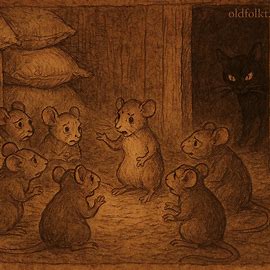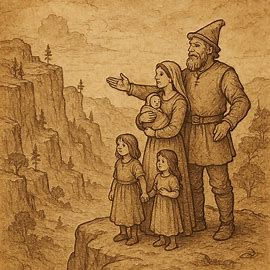Long ago, when shadows stretched long across the dusty earth and the moonlight silvered the quiet fields, the mice of a village lived in constant fear. Their old and relentless enemy, the cat, prowled through the night with silent paws and sharp eyes. Wherever the mice went, whether to gather crumbs or whisper in their holes, danger followed. Life had become unbearable. So, one day, the mice gathered in a grand council, determined to find a solution that might finally bring them peace.
They came from every corner, the young, with their quick steps and bright eyes; the mothers, carrying wisdom sharpened by struggle; and the strong, who prided themselves on boldness. The council was held in an abandoned granary, its wooden beams echoing with their squeaks and murmurs. When they were all assembled, silence fell. Then the eldest among them stood and raised the matter that weighed heavily on every heart:
“Our enemy, the cat, has made our lives miserable. Each night we perish by her claws. What shall we do?”
The mice broke into heated discussion. Some squeaked in anger, others in fear, but all agreed that something must be done. At last, one young mouse, clever in tongue and eager to be heard, rose and said:
“I have the perfect plan. Let us tie a bell around the cat’s neck. That way, when she comes near us, we shall hear the sound of her bell and flee before she strikes.”
A murmur of approval spread through the crowd. Tails flicked in excitement, whiskers quivered in hope. “Yes!” many cried. “The bell will save us! We shall no longer be taken by surprise. This is wisdom! This is deliverance!” The council buzzed with relief, and the mice left the gathering convinced they had solved their greatest problem.
But among them was one who had not attended, the grandfather of the mice, an ancient creature with fur faded by time and eyes dimmed yet still piercing. He was too frail to attend the granary meeting, but when the others returned, he called them close.
“My children,” he asked, “what have you resolved?”
Full of pride, they shared their decision. “Grandfather, we have agreed that the cat will be defeated. We will tie a bell on her neck. When she comes to kill us, we shall hear the bell and escape from her claws.”
The old one listened carefully. He did not nod, nor did his whiskers twitch in joy. Instead, he let out a long sigh. Then, in a slow, thoughtful voice, he spoke:
“You have planned well, my children. The wisdom of your council is clear. But tell me this, who among you will catch the cat and tie the bell upon her neck?”
His words fell like stones in a still pond. At once, the mice grew silent. Their eyes darted from one to another, their tails trembled, their courage shrank. Who indeed would dare approach the very beast that had stolen so many of their kin? Who would risk life itself to place the bell that promised safety?
The young one who had proposed the idea lowered his head. The strong who had puffed their chests now shrank into the shadows. Mothers clutched their little ones closer, unwilling to volunteer them for such peril. Fear crept into every heart, and no voice dared answer the old mouse.
At last, in the silence, the truth was plain. Their plan, so clever in words, was empty in deeds. Not a single mouse had the courage to carry it out. The council that had begun with hope ended with despair.
And so, the proverb was born: “It has become like the council of the mice”, words used whenever fine talk and clever plans lead to nothing, because no one is willing to act.
Moral Lesson
This folktale teaches us that wisdom without courage is like a seed never planted. The mice had a brilliant idea, but none were willing to risk action. In life, solutions often seem simple in thought, yet they demand sacrifice and bravery to be made real. True leadership and progress are not in the ease of planning, but in the willingness to act, even at great cost.
Knowledge Check
1. Who was the enemy of the mice in the story?
The cat, who hunted them constantly.
2. What plan did the young mouse suggest to save the mice?
To tie a bell around the cat’s neck so they could hear her coming.
3. Why did the mice believe the bell idea was a good solution?
Because it would warn them in time to escape danger.
4. What question did the grandfather mouse ask that silenced them?
He asked, “Who will tie the bell on the cat?”
5. What proverb comes from this tale?
“It has become like the council of the mice,” meaning a plan that fails because no one acts.
6. What key lesson does the tale teach?
That wisdom and planning are useless without the courage to act.
Source : Tigrean folktale, Eritrea






